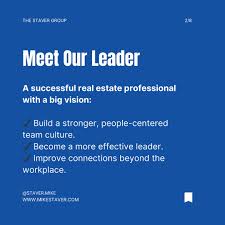Industry changes are constant in the real estate sector. As market trends change and buyer expectations shift, technology is changing the way business is done. Adaptive Leadership is a must in today’s dynamic business environment. The leaders that thrive in the competitive landscape of real estate today are those who have the ability to adjust strategies, adopt innovation and respond with agility.
Adam Gant Victoria exemplify how to be an effective leader in the real estate industry today by inspiring their teams with vision, integrity, and a commitment to turning opportunities into lasting success
To be adaptive, leaders must first understand the world around them. Adaptive leaders pay attention to the market, to client behavior, to emerging technologies. By anticipating changes and not reacting, they can anticipate them. A proactive mentality ensures decisions are well-informed, effective and timely. This gives teams a competitive advantage in an industry that is constantly changing.
Flexible leadership is yet another characteristic of adaptive management. There are no two real estate situations that are alike. No matter if they are navigating changes in regulations, fluctuations in demand for housing, or the implementation of digital tools, leaders who can adapt to change will be ready to pivot. They see obstacles as opportunities to grow, and they encourage their team members to explore new methods of working.
Communication is key to adaptive leadership. Leaders need to communicate clearly, give clear reasons for changes and offer guidance. This will ensure that the teams are aligned, motivated, and able to work together. In fostering an environment of transparency and openness, leaders who embrace adaptive leadership build trust, which empowers their teams to welcome change, rather than be afraid.
Adaptive leadership also focuses on the development of their teams. Recognizing that their team members’ skills, initiative, and creativity are crucial to success, they recognize the importance of these attributes in today’s market. Leadership cultivates a confident workforce by mentoring, providing training and encouraging teamwork. This investment in the people of your organization will improve both the individual’s performance and overall health.
Real estate is more adaptable when it uses technology. Adaptive leaders use digital tools in client management, marketing campaigns, market analysis and virtual tours. Integrating technology into strategies allows leaders to streamline operations, increase client satisfaction, and put their team at the forefront in terms of industry innovation.
The ultimate goal of adaptive leadership is to embrace change, while retaining a strong vision. This is about finding the right balance between flexibility and purpose, innovation and strategy, as well as responsiveness to long-term objectives. Leaders that master this balance thrive not just in an unstable real estate market but also turn obstacles into opportunities, and guide their teams to sustained success.
In a world of constant change, adaptive management empowers professionals in real estate to be ahead of their competition. Leadership creates resilient and forward-thinking organizations through agility and innovation. With adaptability and vision combined with strong leadership, leaders in real estate can successfully navigate uncertain times and produce remarkable results.

